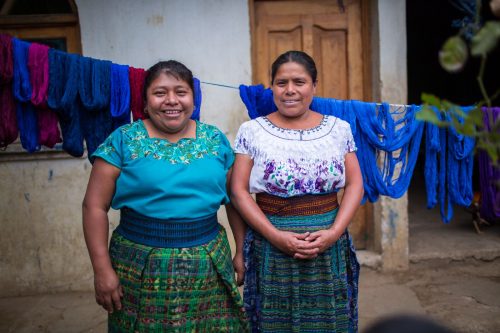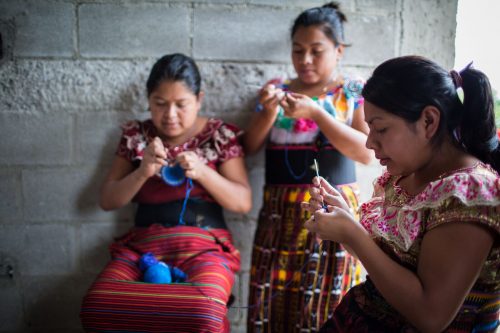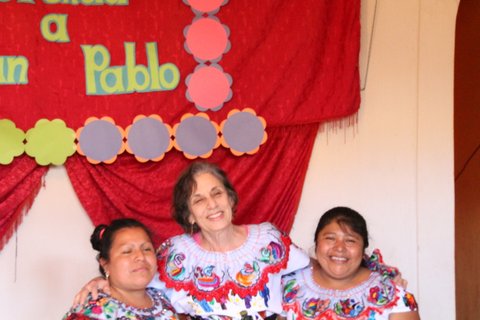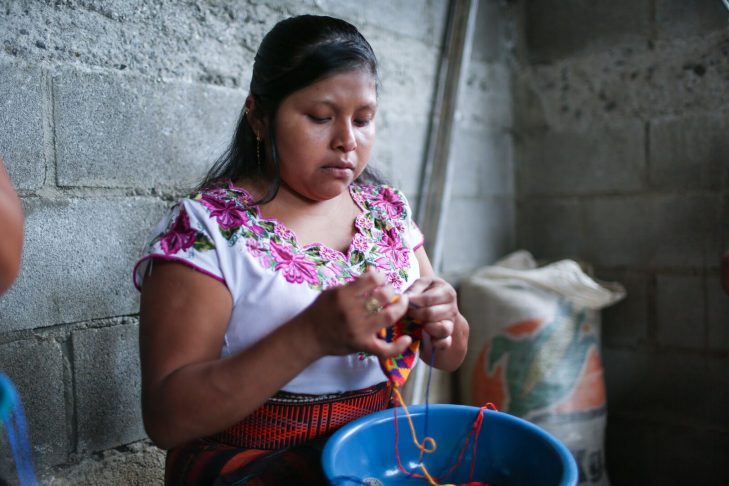When David and Lisa chose Mitzvah Kippot for their wedding guests, they wanted to share the joy of their celebration with the artisans who crocheted them. They knew that because the kippot are fairly traded, the artisans would receive fair payment for them. But Lisa and David could never imagine their decision would impact the lives of the women who made them, and the extraordinary transformations their choice would help create.
How did the Mitzvah Kippot project come about? My husband, Fredy, and I grew up in the Jewish community of Guatemala. As an anthropologist, I lived and worked with Mayan people for many years. Despite their grinding poverty, they always welcomed me, generously sharing their homes, food and lives. My husband and I wanted to do something for the country that had welcomed our ancestors and for the wonderful people that I worked with. So, in 1990, we founded Mayan Hands, a fair-trade organization with the mission of finding markets for Mayan women artisans. We knew that Jewish people would support our project because the principle of tikkun olam, repairing our world, is paramount in their minds.

Miriam Batz leads the women’s group that crochets our kippot. Miriam’s story is one of devastating poverty but also of ingenuity, courage and hope. Her experiences reflect those of most Mayan women in Guatemala today. Miriam was born in the Highlands of Guatemala to extremely poor parents. Her father barely eked out a living working in other people’s fields, while her mother cared for their five young children.
She was 8 when her father died, plunging the family into even deeper despair. Her mother found work in her village but earned almost nothing. “After my father died, I used to go out to the fields with my younger brother looking for food,” she said. “People would sometimes give us old tortillas; that’s often all we ate.” Miriam had to leave school in fifth grade; her mother could no longer support her education. She met her husband at 14. She was desperate to leave a difficult situation at home with a violent stepfather. Their four children were born soon after, and the family was set for a lifetime of poverty.

But Miriam was resourceful. She and her husband worked very hard as day laborers in the fields, and after many years were able to build a small house. She learned to crochet and started going to school at night. She organized a group of women in her village to look for work together and support each other.
The group started selling crocheted hacky sacks to middle men. Initially they earned some money, about $8 or $9 per dozen. But everyone in the village and beyond started making them, and the price dropped to $1.60 per dozen or even $1.20 per dozen, 10 cents each. Accounting for the price of the yarn, the women wound up earning a mere $1.30 per week—but without other opportunities they continued selling these.

When we first discussed the possibility of making kippot, the women said they would make them for $2 each. Learning we would supply the yarn, they lowered the price to $1.30. With thousands of artisans in the country and scant opportunity to sell their work, they knew that price was crucial. We explained that as fair traders our goal was to strengthen their earning power, not to increase our profit at their expense. We supply their yarn for the kippot and pay two-and-a-half times what they requested. Instead of $1.20 per week, they now earn $10 or even $14 per day.
Miriam loves making kippot: “Jewish people use them to cover their heads; it’s like God is accompanying them everywhere, like they are under God’s protection. I feel like our work is serving a special purpose.”
Working with fair trade has changed these women’s lives. Their families are eating well. Their children are getting an education, an especially positive development for the girls who are the first to be pulled out of school because their families’ poverty makes their work indispensable; the girls end up getting married very young, become mothers right away and, thus, repeat the cycle of poverty. Furthermore, a cash income allows women leverage vis-a-vis their husbands; they have more control over their lives as they make decisions about how to spend and save money. Best of all, they can dream, have hope for the future and envision a different world.
For more information or to order our kippot, please contact us at info@mayanhands.org.
This post has been contributed by a third party. The opinions, facts and any media content are presented solely by the author, and JewishBoston assumes no responsibility for them. Want to add your voice to the conversation? Publish your own post here. MORE



